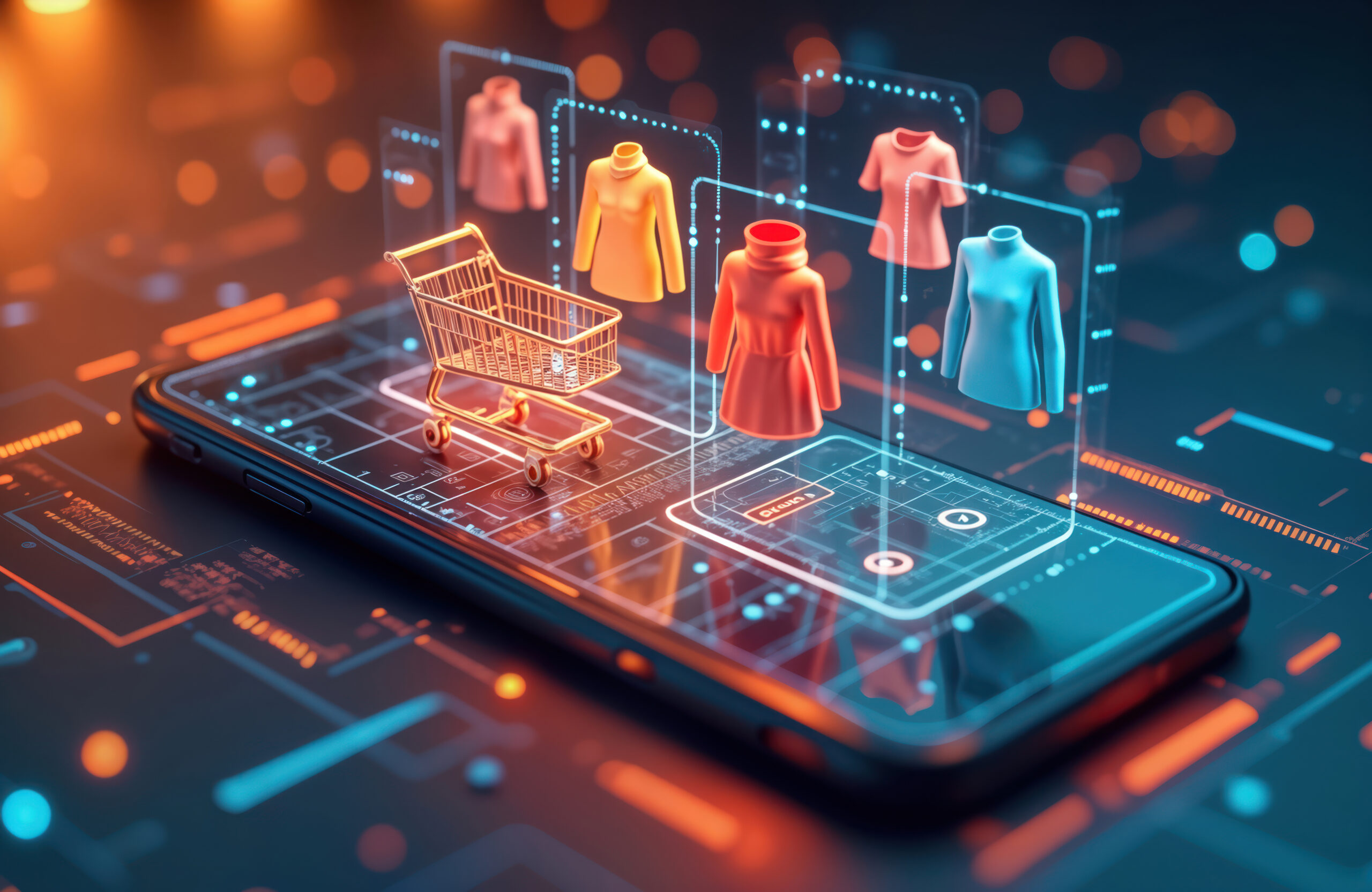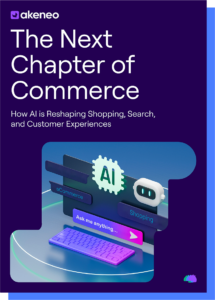AI is reshaping fashion, powering everything from trend forecasting and virtual try-ons to personalized shopping and smarter supply chains. Explore how fashion brands can use AI to enhance creativity and deliver exceptional product experiences.

Table of Contents
Keywords
When you think of fashion, Artificial Intelligence (AI) probably isn’t the first thing that comes to mind. Nothing about systems that mimic human tasks makes you think of clothing racks. Fashion is all about fabrics and runway models, while AI is more about digits and data models. At first glance, they seem like a very odd couple.
Yet, since the early 2000s, AI has been quietly making its way into the fashion world, starting with tools for data analytics and inventory optimization. In recent years, its presence has become increasingly visible, driving innovations such as virtual try-ons and personalized shopping experiences.
What began behind the scenes is now reshaping the entire industry. Let’s take a closer look at how AI is transforming fashion, one breakthrough at a time!
As AI continues to evolve, its role in fashion is becoming harder to ignore. With growing adoption across the industry, AI is actively shaping the way fashion is produced and experienced:
Nowadays, trends within the fashion industry seem to change every other week, and generative AI is enabling designers to explore more ideas more quickly. Tools like Fashable or Raspberry can turn sketches or mood boards into dozens of generated designs in seconds, helping to accelerate the design process and spark unexpected inspiration. For fashion brands, this means fewer physical prototypes and a better shot at keeping up with ever-evolving fashion trends!
But creativity isn’t the only thing AI brings to the table. With the help of AI algorithms and machine learning, brands can analyze sales history, trend cycles, and customer behavior to guide smarter design decisions, which can lead to collections that better reflect what customers actually want, boosting customer satisfaction and reducing supply chain waste. Whether it’s in-store or online shopping, AI is making the shopping experience more relevant and responsive than ever.
Moncler leads as a good example, as they used generative AI to create the Verone AI Jacket. AI tools helped create quilted textures and concepts for extreme-weather gear, laying the groundwork for both the design and marketing of the collection. It struck the right balance between creativity and precision.
In the visually driven fashion world, content is everything. And AI is transforming how that content gets created. From automated image editing to virtual model generation, AI-driven tools are helping fashion brands produce high-quality visuals faster and at scale. For instance, platforms like FASHN enable rapid fashion content creation through virtual try-on technology, allowing designers and retailers to showcase garments on different models—no traditional photoshoots required.
These AI tools deliver efficiency as much as they enhance the shopping experience, especially online. By generating polished content at scale, brands can elevate visual consistency and drive higher customer satisfaction. With AI algorithms powering automated editing and virtual try-ons, fashion brands can deliver high-impact visuals while optimizing resources across their content pipelines.
One of the most immediate and noticeable impacts AI has on the consumer experience is its ability to personalize both the in-store and online shopping journeys. From smart size suggestions to style matching and helpful chatbots that can answer simple queries, AI helps brands deliver more seamless customer experiences that make shopping easier and more enjoyable.
AI is also reshaping how consumers discover and interact with products. Intelligent systems can analyze browsing behavior and user preferences to suggest items that feel tailored to each individual. For example, Sephora’s Virtual Artist app lets users try on makeup virtually, but the real power lies in its personalized product suggestions. By analyzing skin tone and browsing habits, Sephora’s AI recommends products (like the right shade of foundation or targeted skincare) that shoppers may not have explicitly searched for. It’s as if the algorithm reads their mind before they even know what they want!
Marketing in the fashion world has evolved far beyond seasonal campaigns and gut-feel decisions. Today, AI systems and machine learning give brands a data-powered edge, helping them spot emerging fashion trends and optimize campaigns across every channel.
By analyzing real-time data from search behavior and purchasing trends, AI enables more accurate planning and smarter decision-making. Through predictive modeling, brands can identify upcoming trends and even determine the best time to launch new products or campaigns. It helps cut down on overproduction, keeps inventory in check, and ensures marketing hits the right note at the right time, giving brands a much-needed edge in a competitive market!
As AI continues to evolve, so does the way people search for products. More consumers are turning to large language models (LLMs) like ChatGPT, Google Gemini, and others to ask natural-language questions. This shift signals a growing preference for conversational, AI-powered search experiences that go beyond traditional keyword-based queries.
For fashion brands, this means product data needs to be more than just complete. It needs to be structured, accurate, and easily understood by AI systems. If your product content isn’t accessible or readable by LLMs, you risk being left out of the recommendation loop entirely. By ensuring your product information is enriched and available across the right channels, you position your brand to capture this emerging search traffic and remain visible in a rapidly evolving digital landscape.
AI-powered shopping assistants are redefining how people ask questions and make decisions while shopping online. These assistants, often in the form of intelligent chatbots or voice-activated tools, guide users through the buying journey by answering questions and recommending products in real time.
What makes them so effective is their ability to learn and adapt. These tools use customer data and conversational AI to respond naturally, offering personalized suggestions and mimicking in-store assistance. Take Rufus, Amazon’s AI shopping assistant, for example. It helps users discover products by answering natural-language questions like “What do I need for a beginner ski trip?” or “What’s a good gift for a new parent?”. Rufus provides contextual responses that make product discovery intuitive, enhancing the overall shopping experience.
AI has a reputation for damaging the environment, and for good reason, but when utilized correctly, AI can help to make the fashion industry faster, smarter, and more sustainable in the long run. With the help of intelligent forecasting and supply chain optimization, AI can help brands avoid overstock and reduce waste.
Some companies are even using AI to assess the environmental impact of materials or track the lifecycle of a product. Some AI systems can also help ensure that each product includes the right documentation, like Digital Product Passports (DPPs), and complies with evolving industry standards. By improving transparency and traceability, AI empowers fashion brands to make more responsible choices that align with both their values and consumer expectations.
In the fast-moving fashion industry, where product ranges shift rapidly and trends evolve overnight, maintaining high-quality product data is a constant challenge. Akeneo AI-powered PIM helps fashion brands streamline and scale their product information by automatically enriching listings with attributes like color and style directly from product images or descriptions. This automation ensures consistency and helps teams launch collections faster across multiple channels.
A great example of this in action is Courir, a leading fashion retailer that turned to Akeneo Product Cloud to move away from a fragmented, manual process toward a centralized, AI-supported system. By consolidating their product information and automating key workflows, Courir reduced product description and translation time from 10 days to just 24 hours. Manual data entry was cut by 97%, freeing teams to focus on more strategic merchandising. With 96% of their products going live faster and more accurately, Courir not only improved operational efficiency but also elevated the quality of product experiences across every channel.
AI is no longer a future concept, it’s a present-day advantage for fashion brands ready to adapt and innovate. From design and visual content to personalized shopping, AI is reshaping how fashion operates and grows.
As consumer expectations evolve, integrating AI thoughtfully across the value chain is essential. The brands that embrace this shift will successfully keep up with change as well as lead it.
Discover how AI is transforming shopping, search, and product experiences, and why clean, structured data is the key to staying competitive in the next era of commerce.
